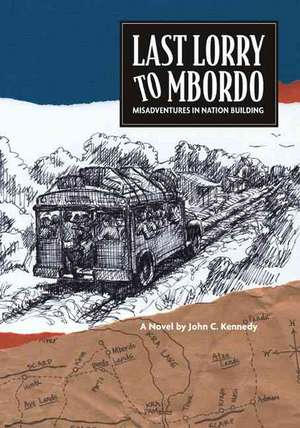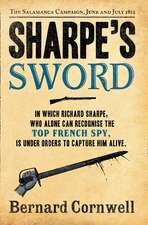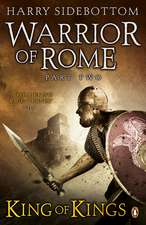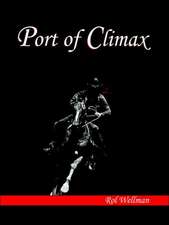Last Lorry to Mbordo
Autor John C. Kennedyen Limba Engleză Paperback
Is it possible that a nation's ability to make peace is more important than its ability to make war? Will we reach a point in the history of humanity when survival depends on the skills of peace making and not war? Is it possible in some far future time we will come to understand that what really mattered in the history of a nation's life was not its ability to make war but its ability to make peace?
We are just starting on this process of learning how to make peace. In war outcomes are seldom predictable and true consequences are known, if ever, only years afterwards. The outcomes of our tentative efforts to make peace seem even less predictable. No nation can match the United States in good intentions. But results are all too often the opposite of what we intended.
This novel is about living and working in West Africa. It is set in the country of Sakra. It is not a sociological tract, nor is it fantasy. The protagonists are fictional but the situations in which they find themselves are similar to those that might be encountered by volunteer teachers in any one of the new nations of West Africa.
The story line revolves about three dominant themes that correspond roughly to the early, middle and latter chapters of the book. The first of these themes is the manner in which outsiders adjust to and develop a sense of their role in a foreign culture.
Alice, a lady of 62, Peace Corps volunteer, and retired from the Washington D.C. public schools; is the focus of the first part of the novel. She is assigned to teach Mathematics at the University-College of Mbordo. Her struggle to adjust, survive, and learn to enjoy living in West Africa is a study in strength andperseverance. Other protagonists are introduced, at first only as incidental to Alice's often traumatic journey from alienation to a level of mutual human acceptance.
In the middle chapters the story line shifts away from Alice's problems to the second major theme of interaction not only between foreigners and Sakraians but also among the ethnic groups of the nation of Sakra itself. The problems of life in Sakra for Africans stand out in stark contrast to the problems that Alice and other expatriates have in adjusting to life in West Africa. Civil strife in Sakra intensifies this contrast. Questions of adjustment become a good deal less significant when survival itself is in question.
The dominant theme of the final chapters is the manner in which events beyond the control of the protagonists lead to personal and public crisis that place them in situations that become tests of character and belief.
Readers Comments
"A gripping must read book for anyone contemplating life in a different culture. A true eye-opener which helps us to examine our own ideas. 'The Last Lorry' takes us for a non-stop ride through another world." -- Joanne Marti, Information Technology Manager
"Engrossing. An engaging adventure and examination of culture, history, and the complexity of personal motivation as seen through the eyes of a fellow Mathematics teacher. A surprising look at where our best intentions can lead us." -- Marjorie M. Barreto, Mathematics Instructor
"In Last Lorry to Mbordo John Kennedy takes us to West Africa in a meeting of two cultures and two worlds. In an intense and entertaining novel the author portrays the work done by dedicated volunteers who try to bridge thegap between different cultures. Full of details, this novel shows the best (and worst) of our people across cultural, ethnic and political worlds. The reader feels transported to the town of Mbordo in the West African nation of Sakra." -- Dr. Norman Maldonado
Preț: 123.46 lei
Nou
23.62€ • 24.72$ • 19.62£
Carte disponibilă
Livrare economică 12-26 martie
Specificații
ISBN-10: 1412000483
Pagini: 274
Dimensiuni: 178 x 254 x 15 mm
Greutate: 0.49 kg
Editura: Troubador Publishing
Notă biografică
John C. Kennedy was born in Lumberton, Robeson County, North Carolina. He attended Ohio Northern University in Ada, Ohio where he completed his BA in 1965. After graduating, he joined the Peace Corps.
The author's specialty was the influence of education on economic development in the English speaking countries of West Africa.
He has devoted a lot of his career to education in both developing countries, and in his own nation. The author taught mathematics in Peki, Ghana from 1965-68, at the secondary school level, at Bell Vocational High School, Washington DC, from 1968-70, and at Northwest Junior High School, Charlotte NC, from 1970-71.
He furthered his own education by completing a Masters degree in mathematics at the University of Illinois, 1971-72. Kennedy began, but did not complete a Ph.D. in Comparative Education at the U of I, 1972-75.
Kennedy continued his passion for teaching when he worked for the Antilles Consolidated School System in Puerto Rico as a mathematics teacher and computer coordinator, 1975-2000.
John C. Kennedy retired December 2, 2000, to become a paperback writer.
You can reach John C. Kennedy at calkennedy@yahoo.com or jkenendy@illinoisalumni.org










